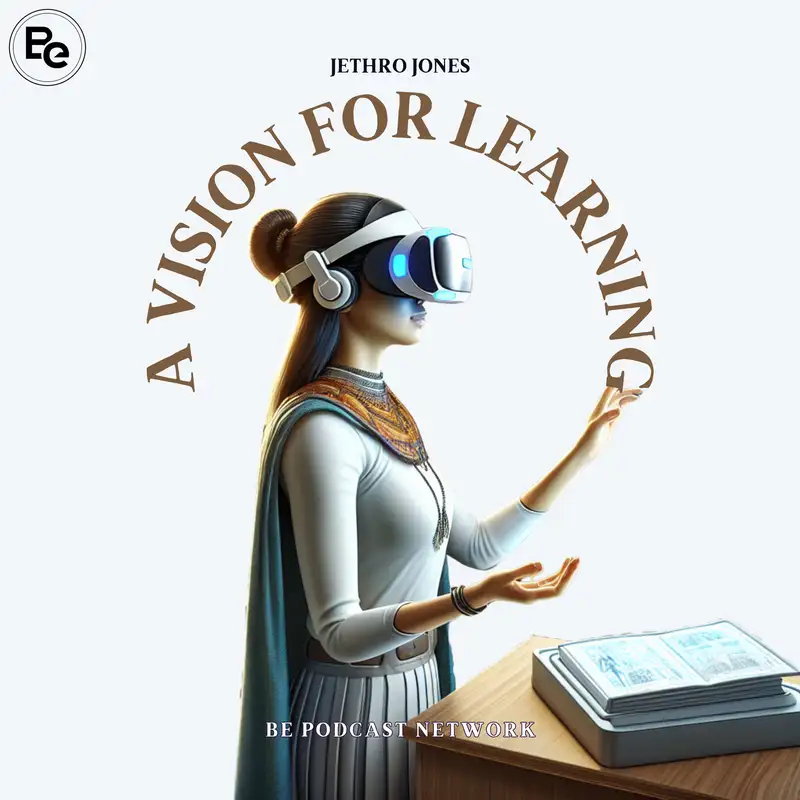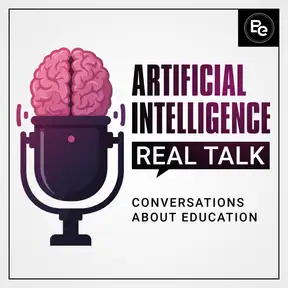AI As a Finishing Agent
Download MP3In this episode of A Vision for Learning, host Jethro Jones invites AI literacy consultant, educator, and academic researcher, Nick Potkalitsky. They discuss the significant role of Artificial Intelligence (AI) in the current and future education system. They explore the importance of building trust and transparency with students while integrating AI into learning practices. Nick shares insights into his teaching methodology, emphasizing that the AI tool works best at the beginning and end of the writing phase. However, he underlines the importance of ensuring AI does not replace critical thinking or become a helpline to avoid hard work but remains a useful tool that enhances learning. They also discuss the positives and pitfalls of plagiarism in the AI era and the ethical implications of AI use in both student learning and teacher resources creation.
00:00 Introduction and Guest Presentation
00:55 The Role of AI in Education
02:11 Addressing Plagiarism in the Age of AI
05:07 The Impact of AI on Teaching and Learning
15:08 The Changing Landscape of Writing with AI
19:00 The Future of AI in Education
- Maintain the human connection first and foremost.
- AI detectors are not that good.
- Detectors introduce a surveillance culture into our classrooms.
- AI Detectors destroy trust
- Don’t have the full impact of rolling out AI tools into writing practices?
- Hesitant to go all-in, but also interested in doing some things with AI.
- Generating ideas ex-nihilo
- We need to do more to prod students because of the pandemic
- Not having the stamina to do things from scratch and then having technology that can do it effortlessly.
- One method is to ignore the AI Tools.
- One method is to adopt the AI Tools.
- One method is to adopt some AI Tools.
- The Other Wes Moore
- Giving kids specific prompts, brainstorming, etc.
- Using AI more socratically.
- Khanmigo asks more questions.
- Concentrated human space for drafting.
- Some commentary from AI
- It’s easy to get AI to do anything, but hard to get it to do one thing.
- Using AI as a finishing agent.
- Need to give AI systems the logical connections between my ideas.
- How using AI himself has helped him use it with his students.
- Using it to generate classroom materials.
- How you’ve used AI yourself.
- Audiopen.ai
- AI is becoming a prosthesis for learning.
- Skipping over the cognitive gains that come from the sustained critical engagement with the writing process.
- How to prevent AI from encroaching on cognitive gains.
- What outcomes do we want to see?
- Help teachers build up watchpoints or criteria to help them know what they should focus on.
- What criteria can we use to evaluate use?
- Power comes from engaging with the tools
- Training materials to use the products to see what is possible.
- My initial response to AI in winter and spring of 2023:
- Exploration of AI detection software, going so far as to securing quotes for large packages for my school
- My summer of study: a personal search for AI literacy
- My late summer realization:
- AI detections are inaccurate, unreliable, inspire a surveillance culture
- My favorite post on the topic
- New research program:
- How does the integration and implementation of AI into today’s classroom impact students' acquisition of more traditional literacy and writing skills and competencies?
- In Sept, very little evidence to ground new practices
- Thus, experiments: very gradual, incremental
- A collective research project
- Writing as knowledge-generation
- The sentence as the locus of new or different thought generation
- My response
- My current thinking: AI allows students to generate both content-knowledge and skills-knowledge
- Students need to know how to write in order to prompt; writing doesn’t disappear in the AI landscape, it just takes on a different form
- Conceptualizing the AI-human workflow
- Different options currently under consideration
- Alan Knowles
- It is my sense that there will not be one “right” way to conceptualize AI-human interactions; that the framework will be context driven
- Implementation Challenges
- K-12: The major research question has not been sufficiently answered with evidence yet.
- Different models:
- Ignore AI–build traditional skills: introduce AI late in high school
- Hybrid: hope a reinforcing feedback loop occurs
- All-in: Writing becomes writing to generate text
- This is not just a pedagogical debate: moral, philosophical, cultural, political
- Probably, no universal across US K-12; more regional approaches subject to change depending upon electoral cycles, technological meltdowns, shifts in news cycles, etc.
About Nick Potkalitsky
Nick Potkalitsky is an AI Literacy Consultant, 7-12 Language Arts Instructor, and Academic Researcher in AI, Linguistics, Rhetoric, and Instruction. He has worked in both private and public settings with students from middle school to graduate school, bringing a wealth of knowledge about these various institutional spaces and students' social-emotional and academic development across this age range to my work developing responsive AI systems. On his Substack, Educating AI, he is currently collaborating with a growing team of researchers, designers, educators, and entrepreneurs to develop a cutting-edge, evidence-based AI literacy program that utilizes skills- and knowledge-generation criteria to guide specific implementations and integrations of AI into teacher work cycles and student case usage. In addition, he collaborates closely with several ed-tech firms developing and testing the next generation of AI-infused instructional tools, aiming to design products that prioritize the needs of teachers and students. He is excited to assist teachers, schools, and districts in creating lasting and meaningful solutions at all scales and stages of the AI integration process.
We’re thrilled to be sponsored by IXL.
IXL’s comprehensive teaching and learning platform for math, language arts, science, and social studies is accelerating achievement in 95 of the top 100 U.S. school districts. Loved by teachers and backed by independent research from Johns Hopkins University, IXL can help you do the following and more:
- Simplify and streamline technology
- Save teachers’ time
- Reliably meet Tier 1 standards
- Improve student performance on state assessments
🚀 Ready to see why leading districts trust IXL for their educational needs? Visit IXL.com/BE today to learn more about how IXL can elevate your school or district.
Creators and Guests

Host
Jethro Jones
Author of #SchoolX #how2be Co-Founder of @bepodcastNet, the best education podcasts out there.

